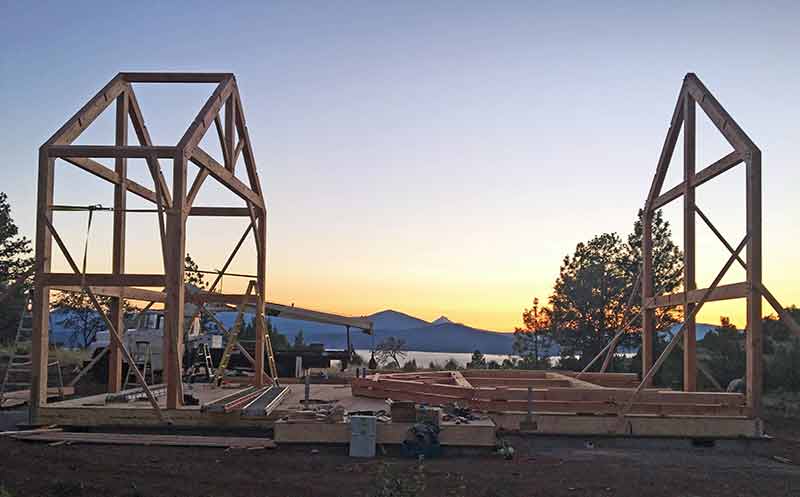When setting out on your home-building adventure, you may lose your current housing situation before your home is ready or simply opt to live on-site during the build. Coming up with a plan before you start can minimize complicated scenarios. Here are a few questions you should ask yourself before making any big decisions.
How long will it take to build?
On average, you should allot 7-8 months to build from start to end. It’s best to give yourself a cushion here. Consider tacking on several more months to your timeline. In the home-building world, unforeseeable circumstances can quickly arise. Contractors get backed up, material shortages happen, and even weather can hold up a project. Plan for at least a year and be prepared to be flexible. Having a backup plan (or even two) can help minimize frustration.
What is your comfort level?
Much of your time energy and focus can revolve around your project while you are building. Consider renting a small apartment for this stretch to have access to amenities. For some, staying with relatives is an option, but others might want to protect their privacy. Others try camping on their land, this is great for some, but don’t underestimate the value of a warm shower and a full kitchen.
All these scenarios are valid, so figure out what suits you. Remember, building a home isn’t always smooth sailing, so setting up a space where you can decompress at the end of the day will be invaluable.
Types of Housing
Below are some of the most common temporary dwelling ideas. You might be able to utilize one for your entire build. In some cases, you might need to bounce around several living situations. Moving can add a lot of stress though, so if you anticipate this being the case, consider keeping your furniture and most of your belongings in storage.
Your Current Home
If you own your current home, you can simply stay there until your new dream home is complete. This is a no-brainer. Your daily routine won’t get disrupted. You won’t have to move your belongings out until you are ready to. Once you move out, you can rent your old home or sell it to raise funds for your new house.
If you need to sell your current home to fund your new project, you will probably have to consider some alternative living situations.
Rent an Apartment
This is probably the second-best option, but there are some caveats. For one, most apartment rentals have year-long leases and don’t offer much flexibility. You might be required to sign another year-long lease if your project gets delayed. Before you sign a lease, be sure to ask if a month-to-month option will be offered after the initial term. With the current housing shortage, it might be tricky to find an apartment or condo that works for your needs and budget too.
Stay With Relatives or Friends
Living with relatives or friends can be tricky, especially for a long-term temporary situation. We recommend that you reserve this option as a backup plan if the project gets delayed or if you need a short-term place to stay between other spots. Your loved ones may cherish and support you and want to help, but they might also value their privacy, set routines, and want quiet time. If you choose this option, consider stashing most of your belongings in storage to avoid cramping their space.
Extended Stay Hotel
This will likely be the costliest option but could also be quite convenient and enjoyable. Most extended stay hotels have kitchenettes, full bathrooms, and laundry facilities. Some even offer a continental breakfast or other amenities like a pool or fitness room. Building a house is hard work. Having a housekeeper to make your bed, sanitize the bathroom and kitchen, and tidy up the space could be a lifesaver during this exciting period. You can’t bring your stuff with you, so you will likely need a storage unit.
Stay On Your Land
The benefits of staying on the land where you are building are so fantastic. You can save money, maintain and you won’t wear out your welcome by crashing with relatives. Being on-site can allow you to monitor the project’s progress.
There are several ways you can do this. Some rough-it by tent camping or living in an RV.
Another excellent option is to purchase an accessory dwelling unit (ADU) or tiny home on wheels. These micro homes can provide all your creature comforts in a small space. While this is an extra expense, it can pay off later. You have the option of using your ADU as a detached guest room. Or you could rent it out for income. Additionally, the space can work as a storage shed, pool house, or backyard office. If you decide you no longer want the building, you can always sell it to recoup some or all of the costs.
Conclusion
To recap, consider the length of stay, and what types of living situations you can tolerate while building your new home. Everyone has different wants and needs. Make sure that everyone in your family is on the same page. While compromise may be in order, there are many paths you can take in this stage of your home-building journey.

